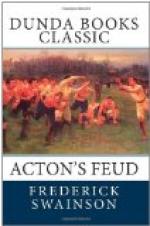“Very sorry, sir,” said Gus, referring to the neuralgia. “Referee!”
“Yes,” said Taylor, with a ghost of a smile at Todd’s astonishment.
“Certainly, I will, sir—I mean I’ll take your place. But the fellows will gasp when I step into the arena.”
“Thank you, Todd. Why will they gasp?”
“Footer isn’t my line, sir.”
“Hasn’t been, Todd. Anyhow, they’ll be delighted when you whistle them up.”
“I hope they’ll be delighted when I’ve finished, sir,” said Gus, doubtfully.
“One side won’t, of course,” said Taylor, cheerfully. “That is natural, and the usual thing. Do you know, I never played football, but I like refereeing immensely. Positive it’s the best thing after playing, and I know that a really first-class referee is a very rare fowl. Of course it’s the off-side rule and, etc.”
Taylor delivered himself of a little homily on the subject of refereeing. He was enthusiastic almost to the point of forgetting his neuralgia, and Todd got quite interested in the theme so earnestly handled. He had not thought there was much fun in it until the house-master unfolded its possibilities, but he took over the whistle fairly sanguine.
“I’ll do my best, sir,” said Gus, in conclusion; “and if they stone me off the Acres——”
“I’ll bury my reputation as a prophet under the missiles.”
In one thing Todd was certainly right. When he found Hargon’s v. Sharpe’s pitch and told the assembled twenty-two—rather diffidently, I must own—that he was the deputy referee, they did gasp.
“Show us your whistle, Gus,” said Higgins, Hargon’s captain, doubtfully.
Gus held it up, with a genial and childlike smile.
“Got the rules in your pocket, too, I suppose.”
“I have,” said Todd—“for reference. But I know now, Higgins, that goal-keepers cannot take more than two steps with the ball, and——”
Sharpe’s lot guffawed at Todd’s neat little thrust at Higgins’s little failing as a goal-keeper.
“But don’t you worry, Hig; I’ll see you through all right. Three-quarter each way, I suppose?”
Todd gave his whole mind to the refereeing, and soon warmed to business. He found that there was heaps more fun in it than he had bargained for, and as he was a sharp, quick, and clever youth he came out of the ordeal with flying colours. He made mistakes, naturally, but momentous issues depended on none of them, and he felt he had not done so badly when Higgins, at half-time, spoke to him as one in authority to another. But Palmer, the captain of Sharpe’s lot—the beaten side—put the coping stone to a pleasant afternoon by asking Gus to referee for them against Merishall’s. Gus walked off the field a happy man.
From that afternoon Todd had no excuse for loafing away any halfer. His services as referee were in demand, not merely as a matter of utility, but of preference. Taylor, who had watched rather anxiously Todd’s progress, smiled easily at the success of his understudy.




